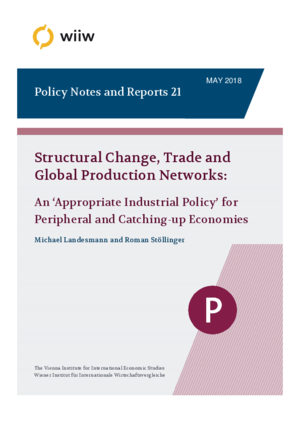Structural Change, Trade and Global Production Networks
Michael Landesmann and Roman Stöllinger
wiiw Policy Note/Policy Report No. 21, May 2018
33 pages including 1 Table and 10 Figures
An ‘Appropriate Industrial Policy’ for Peripheral and Catching-up Economies
The global economy has been undergoing rapid structural change: the impressive development processes in a range of emerging economies have induced strong shifts in global trade shares; international production networks (IPNs) are characterising regional and global trading relationships and we observe also persistent changes in the positions of countries in global value chains due to rather rapid technological and human capital upgrading. The aim of this paper is to assess these developments, but also discuss the importance of – what we call – ‘appropriate industrial policy’ (AIP) for countries at different developmental stages to support their position in the current global context. We emphasise in particular the role of AIP for European low- and medium-income economies (LMIEs) as the recent financial and economic crisis has shown that they are particularly vulnerable with respect to ‘structural external imbalances’ and thus policies to support their tradable sectors are of great importance.
Reference to wiiw databases: wiiw Annual Database
Keywords: appropriate industrial policy, structural change, structural upgrading, Emerging Europe, emerging economies, international production networks, global value chains, catching up, industrial policy and industrial organisation
JEL classification: L16, L52, F15, F14, F63
Countries covered: European Union
Research Areas: International Trade, Competitiveness and FDI
